Many college students really feel that universities and faculties aren’t doing sufficient to arrange them for a future formed by synthetic intelligence (AI), in line with the newest research from OnCampus Analysis and Hostinger.
Though college students are each curious and skeptical about AI, they’re not ready for faculties to catch up. As an alternative, they’re exploring AI on their very own and utilizing it of their day by day lives.
To raised perceive how these college students use, understand, and expertise AI, OnCampus Analysis and Hostinger performed a survey within the US to be taught extra about how college students view the function of AI of their educational expertise.
AI and academia
Synthetic intelligence has had an in depth relationship with academia because the Nineteen Fifties. Dartmouth School hosted the primary recognized workshop in 1956 about AI ideas and analysis inside lecture rooms. But, college students in 2025 are nonetheless defining how AI works with and for them.
Because the mainstream look of the massive language mannequin (LLM) GPT3 again in 2020, AI has reworked a number of industries. However what about greater training?
Let’s study the outcomes of this survey to seek out out extra about college students’ views on the current and way forward for AI in training.
Our pattern
We surveyed roughly 1,600 US college students from undergraduate (77%) and graduate (23%) applications. By way of age, 70% had been between 18 to 24 years outdated, 19% had been between 25 to 34, and 11% had been older than 35.
Essentially the most represented fields of research among the many respondents had been:
- Science, know-how, engineering or math (25%)
- Enterprise (12%)
- Psychology and social sciences (12%)
- Well being or associated levels (11%)
The remainder (round 40%) got here from the humanities, data know-how, the humanities, legislation, and training.
1. Universities will not be doing sufficient with AI, in line with most college students

Greater than half of all respondents imagine faculties are not doing sufficient to arrange them for a future with AI. In whole, 34% of scholars say there isn’t a transparent concentrate on AI of their courses, and 23% mentioned universities and faculties are falling behind.
2. Eight out of 10 college students outline themselves as “cautious” or “skeptical” about AI
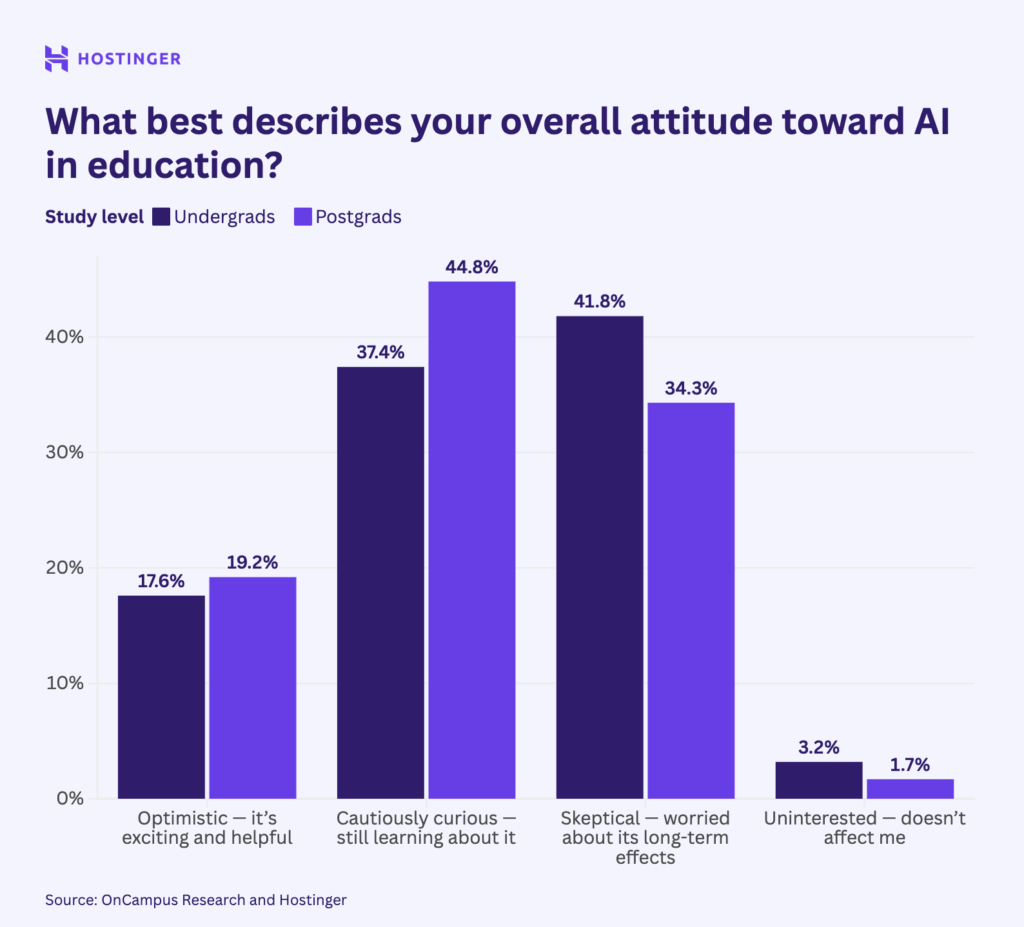
Basically, 80% of all respondents outline their stance in direction of AI as “cautious” or “skeptical.” When taking a look at undergraduates and postgraduate college students individually, we see that these two teams have barely totally different views:
- Nearly half (45%) of grasp’s college students outlined themselves as “cautiously curious,” whereas 37% of undergraduates selected this reply.
- Forty-two p.c of undergrads claimed to be frightened about AI’s long-term results, whereas 34% of grasp’s college students shared this concern.
In different phrases, undergrads – normally youthful than postgraduates – are extra involved about AI’s long-term results. The other applies to grasp’s or PhD college students: they’re extra curious than frightened in regards to the long-term results of AI.
3. Most college students are aware of AI
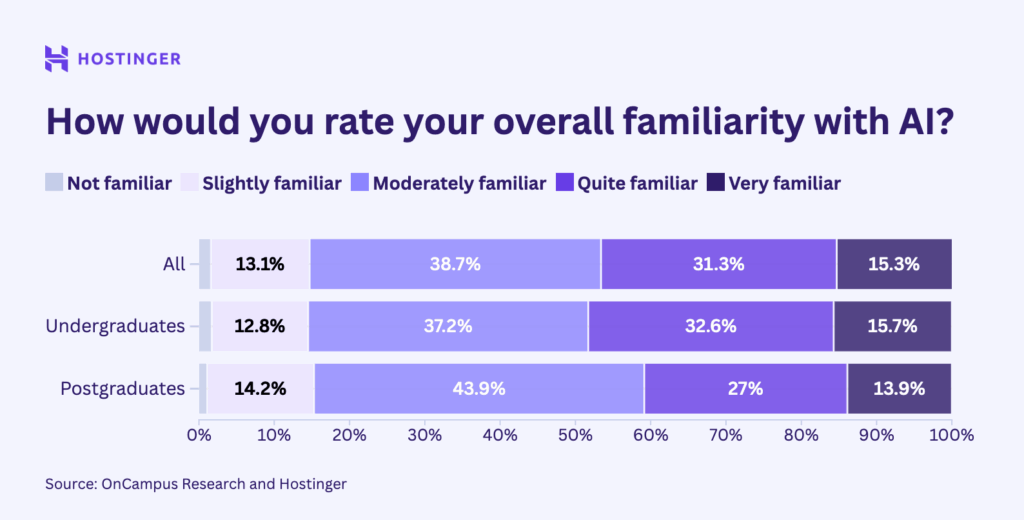
Statistics mirror the large affect of AI within the final 5 years. Almost half (46%) of all college students really feel snug or very aware of AI, and 39% really feel they’ve an affordable understanding of it. Lower than 15% of respondents claimed to be unfamiliar with AI.
4. Nearly 70% of scholars have used AI for writing
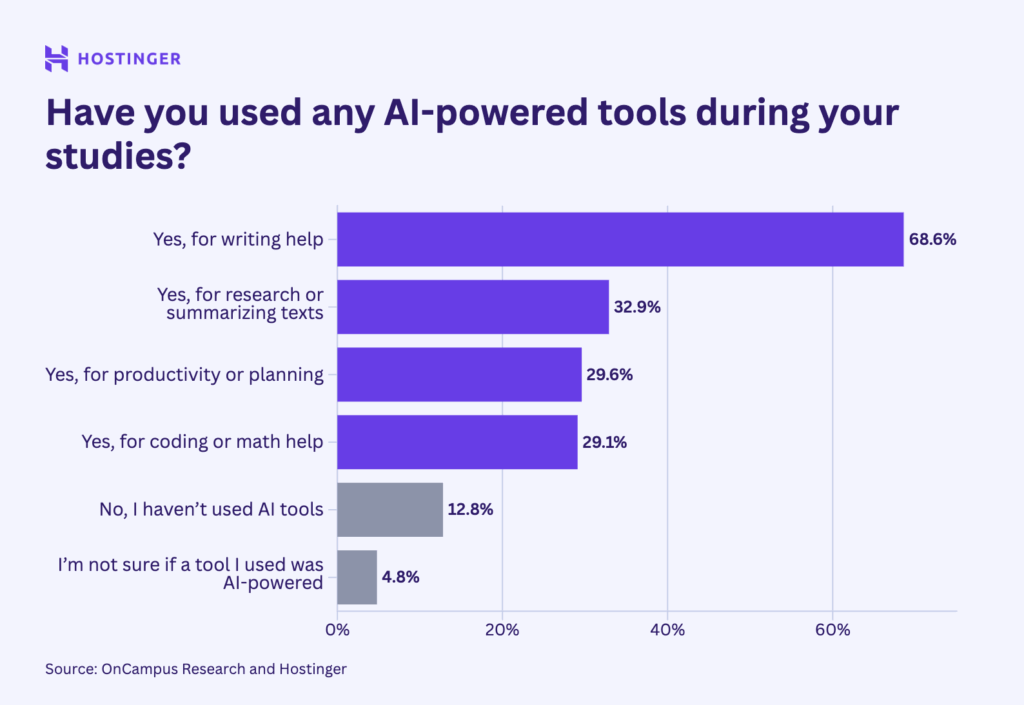
About 69% of scholars mentioned they use AI to enhance their writing. Round 30% of them mentioned they use AI for every of the next duties: researching, summarizing articles, planning, managing time, doing math, and writing code. Respondents had been capable of choose a couple of reply to this query.
5. AI saves time for different duties in college students’ lives
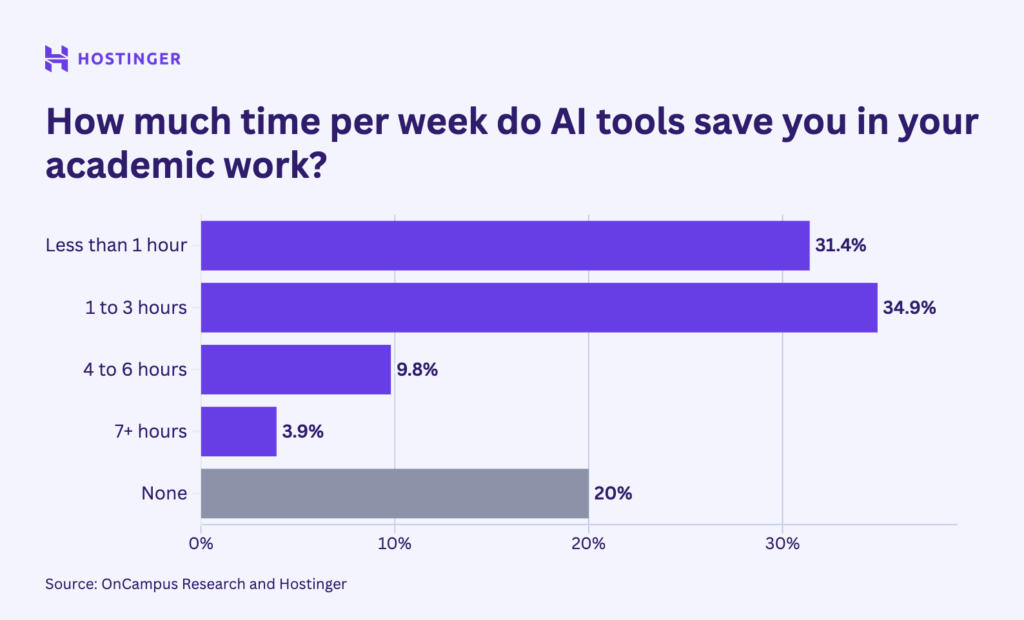
When OpenAI’s ChatGPT went viral in early 2023, one of many first arguments in favor of utilizing such tech was how it might assist individuals save time. Based on our survey, on a weekly foundation:
- 35% of scholars declare AI saves 1 to three hours of their time.
- 31% of scholars say it saves them lower than 1 hour.
- Round 14% reported AI saving greater than 4 hours of their time.
20% of respondents mentioned AI doesn’t save them time.
6. AI and time saving: Research, work or leisure
Primarily based on these responses, practically 80% of scholars use AI to make their routines extra environment friendly.
What do they do with the time they save? About 28% mentioned they use it to check extra. One other 17% spend it working or working aspect hustles away from faculty. Different college students desire to make use of their saved time to relaxation (7%) or socialize (6%).
Nevertheless, 28% mentioned they both don’t save a lot time or are uncertain in the event that they do.
7. Reflecting on AI and educational efficiency: From indifference to confidence
Individuals are questioning how work and educational processes could possibly be automated with AI, from gross sales chatbots that filter results in reviewing an essay. Within the case of scholars, the interplay with AI raises a query of the way it makes them really feel in regards to the last output and their educational efficiency. Our survey reveals a variety of feelings:
- 30% really feel impartial about AI.
- 32% really feel extra assured and productive because of it.
- 19% really feel anxious.
- 17% are detached.
- 2% really feel overwhelmed.
8. One-third of scholars state AI helps increase focus
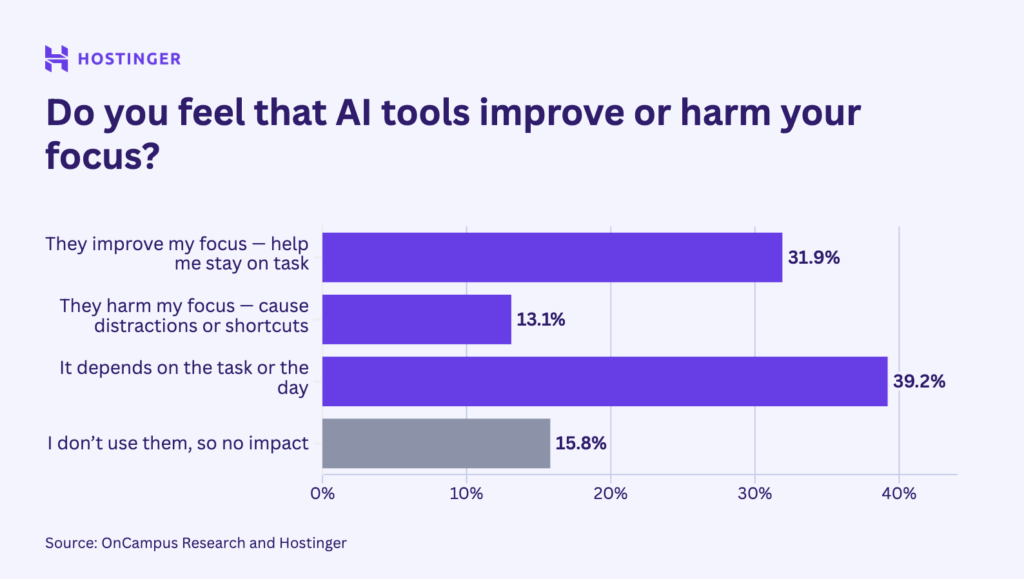
32% of surveyed college students imagine AI boosts their capacity to pay attention. Quite the opposite, 13% of scholars mentioned AI distracts them and makes it more durable to focus.
Regardless of each views, a lot of the college students (40%) mentioned that the diploma to which AI influences their capacity to focus is dependent upon the duty at hand and the day in query.
A view on the way forward for AI and academia
“This survey – like most research on the market – reveals that AI is bringing main modifications to society,” says Mantas Lukauskas, AI Tech Lead at Hostinger. “However what’s actually altering is how rapidly individuals can adapt. As the scholars’ solutions present, some are keen to make use of AI, whereas others are extra cautious and like to carry the brake.”
“At Hostinger, we imagine AI makes entry to data and instruments extra democratic. Whether or not it’s a publication, a web site, or an internet app, AI enables you to construct what’s in your thoughts,” Mr. Lukauskas provides. “In training, the important thing query concerning AI must be how crucial considering can develop alongside creativity and deeper understanding.”
Closing ideas
Regardless of feeling that universities and faculties are falling quick in making ready them for a future the place AI use can be commonplace, college students are independently partaking with it. They harbor fears and doubts about AI whereas utilizing these instruments to jot down, analysis, and plan.
Most college students surveyed imagine AI permits them to save lots of 3 hours or much less per day. Additionally, a big group of respondents indicated that their focus has improved, whereas others really feel this varies relying on the duty and the day.
The distinction between the destructive and optimistic points of AI at universities displays views on AI within the higher society. Academia is in a stage of adaptation, as AI is altering the way in which we develop the abilities and data required by society.
Methodology
- OnCampus Analysis and Hostinger launched the survey in Might 2025. In whole, we acquired 1,648 responses.
- The target market of the survey was undergraduate and graduate college students of United States faculties or universities.
- The survey was distributed by means of on-line kinds.
- Responses had been filtered by college students’ present degree of training.










